Key takeaways:
- Rejection impacts self-esteem but can lead to personal growth and resilience through reflection and embracing it as part of the journey.
- Cultivating a positive mindset through gratitude, celebrating small wins, and surrounding oneself with uplifting influences helps transform setbacks into opportunities.
- Developing a support network and embracing continuous learning fosters motivation and encourages a perspective shift, viewing rejection as a stepping stone rather than a failure.
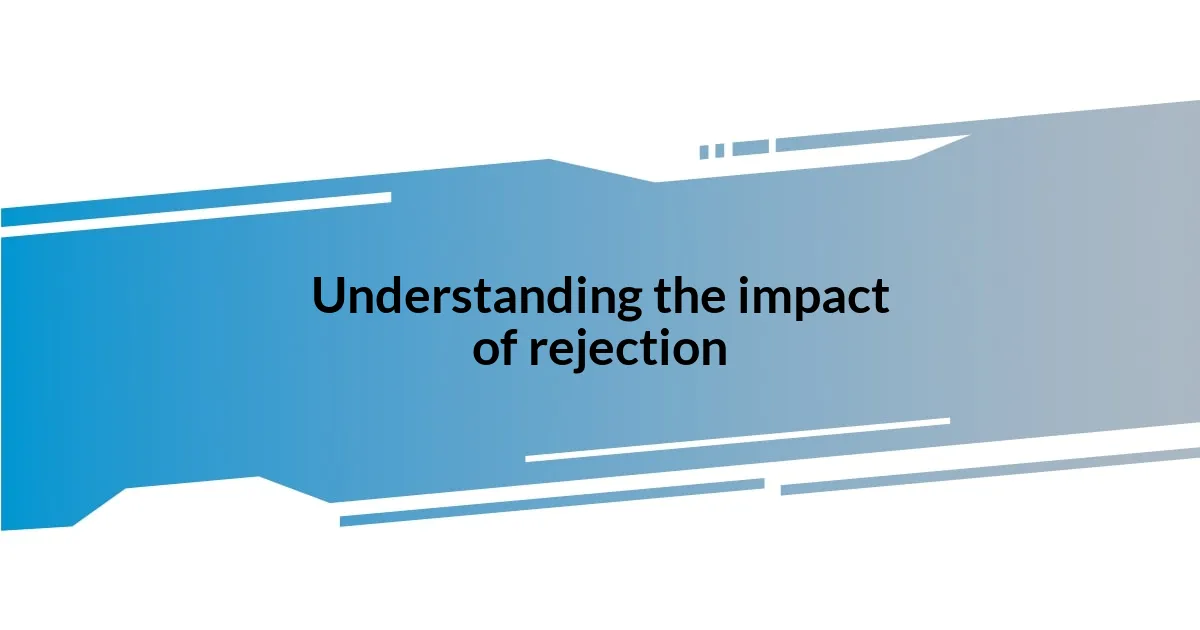
Understanding the impact of rejection
Rejection can cut deep, rattling our self-esteem and stirring up feelings of inadequacy. I remember when I was eagerly waiting to hear back about a project I had poured my heart into, only to find out it wasn’t selected. It felt as if my dreams had been dismissed with a single email, making me question my abilities. Have you ever felt that sting?
The reality is that the emotional impact of rejection can linger, influencing our mindset and decisions moving forward. It’s fascinating how one experience can shape your outlook—after that rejection, I was hesitant to put myself out there again, fearing a repeat of disappointment. How do we dust ourselves off and regain that spark?
In the aftermath of rejection, I’ve learned that while the initial pain is real, it often sparks growth. For instance, analyzing what went wrong or seeking feedback opened doors to new opportunities I hadn’t considered before. Has your own experience with rejection ever led you to a path you didn’t expect? Embracing rejection as a part of the journey is crucial; it teaches resilience, reminding us that every “no” can ultimately lead to a “yes.”
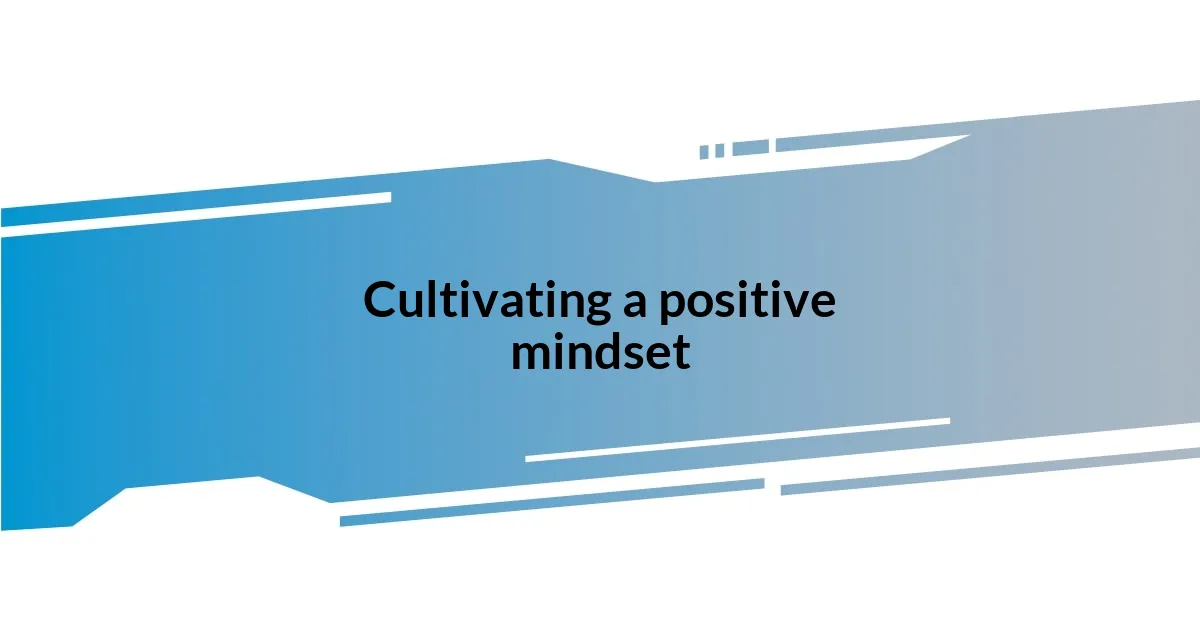
Cultivating a positive mindset
Cultivating a positive mindset is essential when facing rejection. I’ve often found that the way I interpret setbacks directly affects my motivation. For instance, after being turned down for a job I had my heart set on, instead of spiraling into negativity, I took a step back and reflected on what the experience could teach me. I remember shifting my focus to the skills I gained from the application process, which not only softened the blow but also fueled my determination for future opportunities.
To further nurture a positive mindset, here are a few strategies that have worked wonders for me:
- Practice Gratitude: Every day, I jot down three things I’m grateful for, which helps me keep perspective.
- Surround Yourself with Positivity: I make it a point to spend time with friends who uplift my spirits and inspire me to keep moving forward.
- Celebrate Small Wins: Acknowledging even the tiniest achievements reminds me that progress isn’t always about major milestones.
- Engage in Self-Care: Whether through exercise, reading, or hobbies, prioritizing my well-being is crucial in maintaining a positive outlook.
- Visualize Success: When I start feeling anxious about potential rejection, I take a moment to visualize what success would look like, which boosts my confidence.
By focusing on these methods, I’ve learned to transform rejection into a stepping stone rather than a stumbling block.
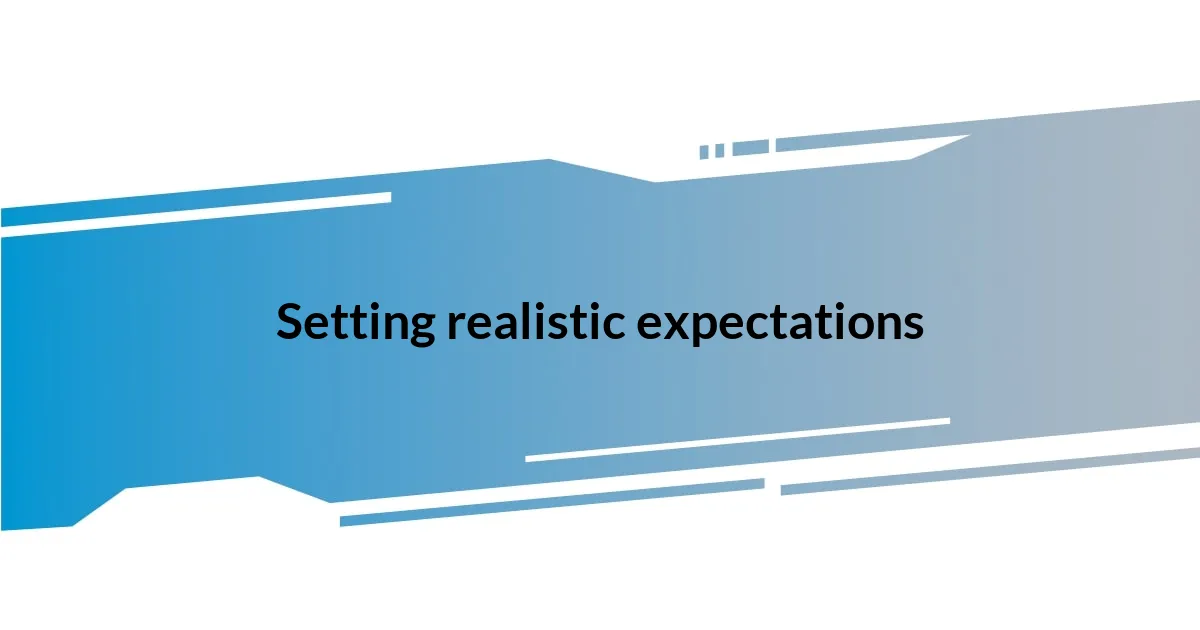
Setting realistic expectations
Setting realistic expectations is often the first step in navigating rejection. I vividly recall the time I pitched an idea I felt passionate about, only to receive a lukewarm response. I had built it up in my mind as a surefire success, but the reality taught me that crafting a vision is one thing; managing expectations is another. By accepting that not every idea would resonate, I gave myself the freedom to explore creatively without the paralysis of perfection.
Moreover, it’s crucial to differentiate between ambitious goals and unattainable fantasies. While aiming high can be a source of inspiration, I’ve learned that a balance is essential. For example, when I applied to a highly competitive program, I prepared for the possibility of rejection as much as I dreamed of acceptance. This dual approach allowed me to be hopeful yet grounded, helping me to appreciate my efforts, regardless of the outcome.
Ultimately, the process of setting realistic expectations empowers personal growth. I’ve come to realize that every “no” is not a rejection of me, but rather an opportunity to recalibrate my path. Reflecting on each experience, I now see that by managing my expectations, I can view rejection through a lens of curiosity and motivation, allowing for resilience to flourish even in the face of setbacks.
| Unrealistic Expectations | Realistic Expectations |
|---|---|
| Believing every idea will succeed without feedback | Seeking constructive criticism and learning from setbacks |
| Aiming only for top-tier results | Valuing personal growth and progress in every attempt |
| Viewing rejection as a personal failure | Seeing rejection as a stepping stone for future opportunities |
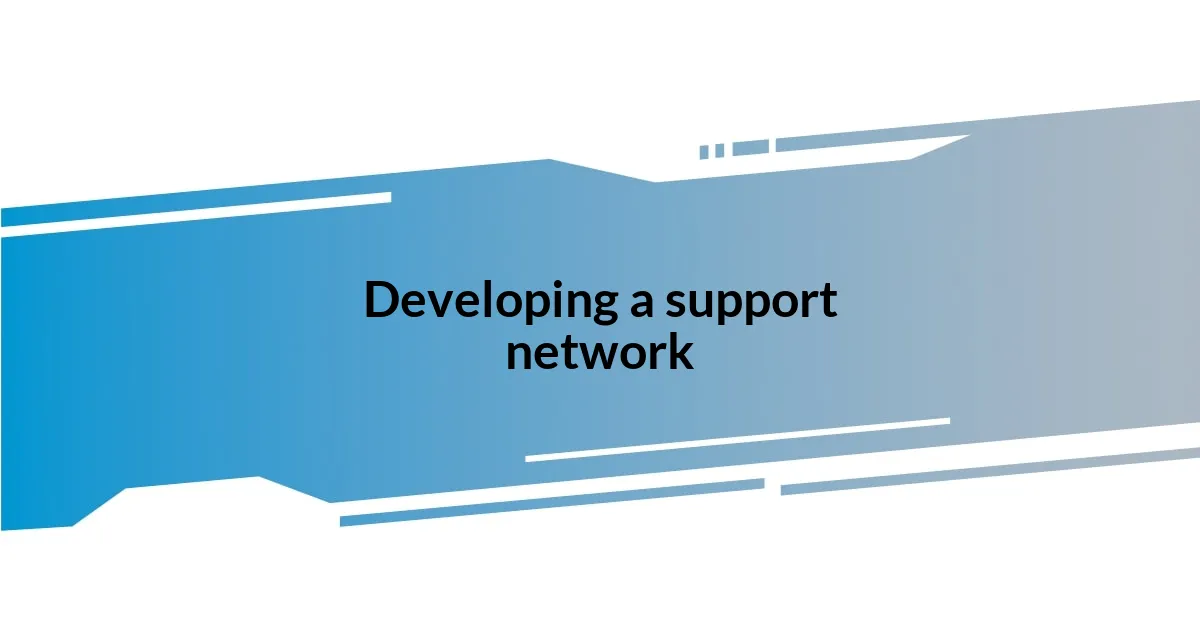
Developing a support network
Building a strong support network is crucial for staying inspired amidst rejection. I remember attending a workshop where I met like-minded individuals who were also navigating their own creative paths. These connections cultivated a sense of belonging, and I found that sharing struggles can be incredibly empowering. It’s amazing how a simple chat with someone who understands can reignite your motivation.
Having a diverse support network keeps me grounded. I surround myself with friends from various backgrounds—some who are professionals in creative fields and others who excel in completely different arenas. Their unique perspectives often bring fresh insights that help me see rejection as a universal experience rather than a personal failure. Doesn’t it feel comforting to know you’re not alone in facing setbacks?
Moreover, I think it’s vital to be proactive in nurturing these relationships. Regular check-ins with my support group help build trust and foster an environment where we can be openly vulnerable. After a tough rejection, I often reach out to share my feelings, and I’ve found that doing so not only alleviates my burden but strengthens our bond. So, why not start reaching out? You might just discover an untapped well of encouragement waiting for you.
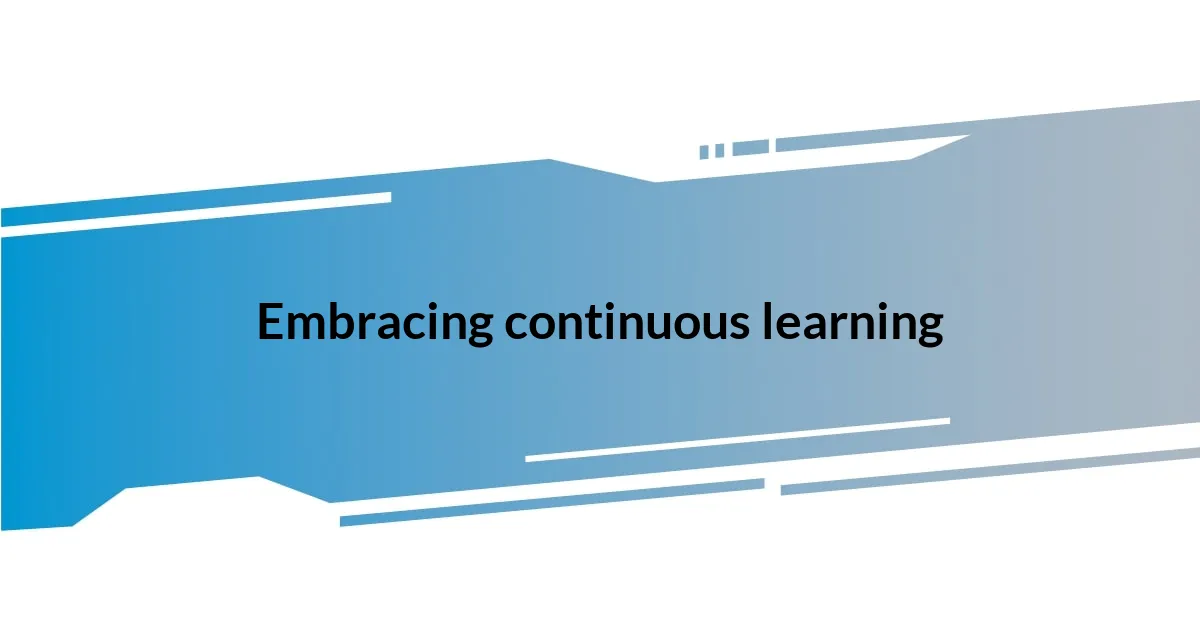
Embracing continuous learning
Embracing continuous learning is a mindset I’ve cultivated, especially after facing rejection. I remember preparing for a big presentation and pouring my heart into it, only to stumble over my words and feel like it was a disaster. Instead of wallowing in embarrassment, I chose to see it as a lesson. Each hiccup became an opportunity to refine my skills, whether it was practicing in front of friends or studying effective communication techniques.
In my experience, adopting a growth mindset can transform setbacks into stepping stones. When I didn’t get a callback after an audition, it stung. But rather than giving up, I sought feedback and took acting classes. That decision not only improved my craft but also deepened my confidence. I often ask myself, “What can I learn from this?” This question has been pivotal—it encourages curiosity and opens doors to new adventures.
The beauty of continuous learning lies in its ripple effect. Every new skill I pick up sparks different ideas and fuels my creativity. I realized that the more I learn, the more I can adapt, whether it’s adjusting my approach to a project or pivoting in my career. Isn’t it fascinating how each rejection can lead to unexpected growth and fresh perspectives? Embracing learning has not just kept me afloat; it’s made my journey vibrant and full of possibilities.
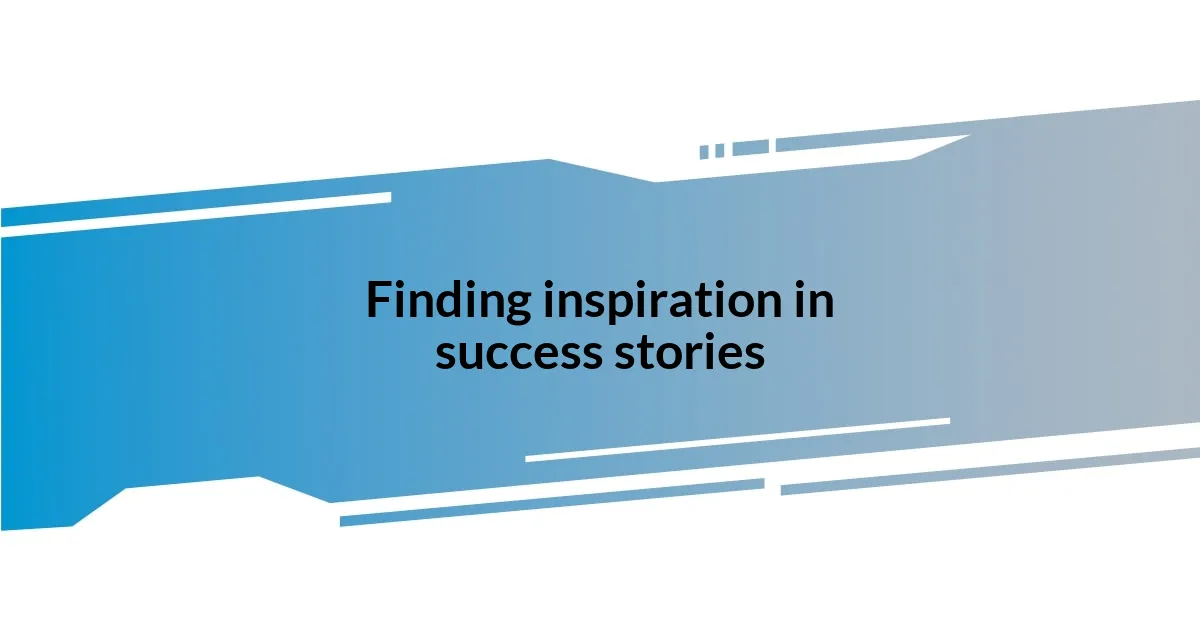
Finding inspiration in success stories
Finding inspiration in success stories has always been a game-changer for me, especially during challenging times. I vividly recall reading the journey of a famous author who faced numerous rejections before her first book was published. With each setback, she grew more resilient, and her story reminded me that success isn’t a straight path but a winding road filled with bumps. Doesn’t it feel reassuring to know that even the greats have struggled just like us?
Another moment that struck a chord was when I learned about a well-known entrepreneur who started his business in a garage. He faced countless rejections from investors, but instead of giving in to despair, he sought out feedback and adjusted his vision. I couldn’t help but reflect on my own experiences; when I’m met with a “no,” it’s a prompt for creativity. Have I ever thought of rejection as an invitation to think differently?
I often find solace in sharing these success stories with friends, too. They serve as powerful reminders that setbacks are part of the journey. Just last week, I shared an inspiring tale of a musician who released a song that flopped several times before it finally took off. We laughed at the irony but also felt a collective spark of motivation to push through our own rejections. Isn’t it beautiful how these narratives can uplift our spirits and rekindle our determination?
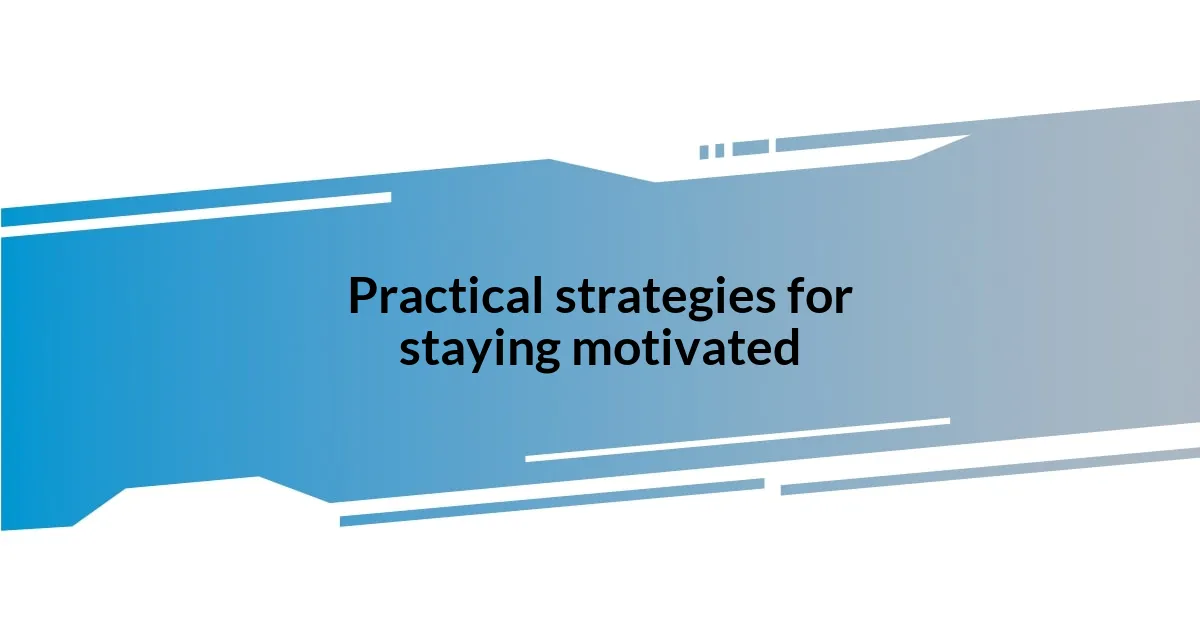
Practical strategies for staying motivated
One practical strategy I’ve found incredibly helpful for staying motivated is setting small, achievable goals. It’s easy to feel overwhelmed by rejection, but breaking larger tasks into bite-sized pieces creates a sense of progress. For instance, after a disappointing submission, I decided to target one specific aspect of my work to improve each week, like enhancing my writing style or learning a new technique. Isn’t it rewarding to celebrate those small wins? It’s those little victories that add up, reminding me that I’m on the right path.
Another powerful approach involves surrounding myself with positive influences. I make it a point to connect with like-minded individuals who share their stories of perseverance. Just recently, I joined a local writing group where we critique each other’s work. The encouragement and constructive feedback I receive not only boosts my confidence but also solidifies the idea that we’re all in this together. It’s comforting, don’t you think? I’ve found that those moments of camaraderie can lift my spirits during the inevitable lows.
Lastly, I’ve recognized the value of self-reflection as a motivational tool. After dealing with rejection, I take time to journal my thoughts and feelings. This simple act not only provides clarity but also helps in identifying patterns that I might want to change. Recently, after reflecting on a particularly difficult experience, I realized it wasn’t just the rejection that affected me, but my interpretation of it. What if I started viewing rejection as simply a part of my personal evolution? That shift in perspective has been liberating, allowing me to embrace the journey with open arms.
